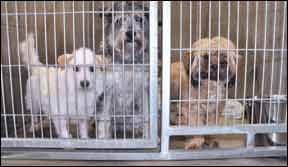The animal shelter where I often volunteer is less than a mile from a big box super store. Both are located in a low-income town in a low-income county – a rural area in northeastern California (i.e., not one of the parts of the state that you’ve heard about). Donations to the shelter are welcome, much-needed, and scarce. So, when the shelter gets a call, as it does occasionally, from a manager at that big-box store, saying that he has some dented cans of cat food or ripped bags of dog food or kitty litter that he’d like to donate to the shelter, an animal control officer is immediately dispatched to go pick up that donation, with gratitude. These donations tend to be small, but regular, and they definitely help the shelter feed and care for more animals than it would be able to otherwise.
So I thought it would be a great thing when a big-name chain pet supply store recently opened in our town; surely that store, too, would donate damaged packages of pet food to the only animal shelter serving the town and county. But then I learned that the chain actually has a policy dictating that all the perfectly good pet food in packages that have become damaged is destroyed and thrown away.
I’ve since heard a number of explanations for the policy of that store chain and others. Storage is a problem, especially once packages are open; food needs to be consumed soon after its exposure to air. Also, insects and other pests are attracted to opened packages. And then there are liability issues; what if the donated food made pets at a shelter ill? Or if the shelter sent some of the donated food home with an adopted animal, and that pet or one of the other pets in the home became ill after eating the donated food?
It was also suggested that if it was widely known that damaged packages of food were donated directly to a specific shelter or rescue group in town, volunteers or even employees of the shelter or rescue group might have an incentive to visit the stores in order to surreptitiously damage packages or slice open bags.
Okay, I get that. It might sound like a petty fear, or an unlikely scenario, but I could see that happening, especially when passionate animal lovers are desperate to do anything they can to save lives and stretch animal shelter budgets.
But it also doesn’t seem insurmountable; surely someone could come up with an innovative program that would allow all that perfectly good food to be donated to needy animals, without creating an incentive for tampering.
Looking for a model
I started making inquiries, to determine what happens to damaged packages of pet food all across the pet food production chain, and to see if I could find a model of smart charitable diversion of products that would otherwise be wasted.
I called several independent, “mom and pop”-type pet supply stores, and in each case, was told that products from damaged bags are generally taken home by pet store owners, given to store employees for their pets, or donated to local shelters.
Then, eureka – I found it: a chain pet supply store with a formal donation program in place to provide perfectly good food that would otherwise be wasted, to animal-related charities.
Pet Food Express is a relatively local chain, with 43 pet supply stores in the greater San Francisco Bay Area. Mike Murray is the Director of Community Relations for the chain. “We guarantee all of our products, so if a customer’s dog doesn’t like a food, for example, they can return it. We examine the food to make sure it smells and looks okay. We check the date code to make sure it’s fresh and not near its expiration date. If it appears to be fine, we collect it and send it to our warehouse, along with any packages that have been damaged in the store. Every Thursday, we open the warehouse to specific animal-related charities and distribute all of that food.”

288
Any food that has been implicated in any sort of recall is discarded or sent back to the manufacturer. So is any food that an owner thinks has made her pet ill.
Pet-related charities in the area apply to participate in Pet Food Express’s giveaways. Each must provide proof of their nonprofit status, as well as a sample of their adoption contract. “We want to make sure that we are supporting only those groups who are doing the right thing by their animals.” For example, all the groups in Pet Food Express’s program must have a spay/neuter requirement in their adoption contracts. They must also agree to take back any animals that don’t work out for the adopters.
Once they are qualified for the program, they are invited to the warehouse to pick up donations once every three months. “That way, we can spread the food around widely,” says Murray.
But not too widely; Pet Food Express caps the number of groups who participate in the program, and maintains a waiting list for others who want to enroll.
“If we worked with every group who was qualified, the amount we gave each group might not be worth the trip,” says Murray. By limiting the number of groups who are invited, Pet Food Express makes sure that the amount of goods each organization receives is significant. (This rotating donation also ensures that there isn’t an incentive for individuals from any animal rescue group to deliberately damage packages in the stores, a fear expressed by other store managers.)
Pet Food Express donated more than 275,000 pounds of pet food to animal charities last year, as well as many “hard goods” – things like wire crates that are slightly bent or dented dog bowls.
No news is (probably) bad news
I received no response from Petco, Costco, or Walmart regarding their policies for dealing with wasted products.
I did receive a very prompt response from PetSmart, confirming the information I had heard informally, that damaged pet food is destroyed and discarded. A response from the chain’s public relations department said in part, “Our stores destroy pet food products that have been damaged. On the surface, one could easily conclude that it’s simply a matter of picking up the damaged bag and giving it away. But in truth, it’s a much more complicated and challenging problem given the volume of products we deal with in our stores.
“Damaged food bags can expose the food to contamination which poses a health risk to pets so we do not donate expired food that may be spoiled. Damaged foods also create storage and distribution challenges for our stores. For example, our stores have extremely limited storage space and it becomes a problem to store damaged goods until they can be picked up by a deserving local animal welfare organization.”
It’s a safe bet that most other pet food chains and big-box stores have similar policies that lead to the destruction of perfectly good food, at least at the retail level. Fortunately, the news is better when you dig deeper down into the distribution chain.
Distribution centers
Most stores, whether independent or chains, receive their products from pet food distributors – companies who pick up products from the manufacturers, and distribute the products to stores. There are a few dozen major pet food distribution companies in the U.S., and each tends to specialize, carrying similar products to similar retail outlets. For example, there are distribution companies that handle only higher-end, “natural and holistic”-type products, delivering them to independent pet supply stores and small chains. Other distributors may specialize in lower-cost products or higher-volume chains.
Large “pet specialty” chains such as Petco and PetSmart have their own distribution centers, as do national retail outlets that carry pet food, such as Tractor Supply and Costco. And of course, giant grocery chains also have their own distribution centers and providers.
Each time a pallet of pet food bags or cans are picked up by a forklift and moved, whether in a warehouse, onto or off of a truck, or onto the receiving dock of a retail outlet, the product packages are vulnerable to damage. Bags can split any time a pallet bumps into a wall or shelf as a forklift operator moves it. A single careless swipe of a box cutter, used to remove the swaths of plastic shrink-wrap that holds a pallet of food together, can slice open a bag of freshly produced, premium food, thus transforming it into “waste” food.
But because they have had control of the product, and know exactly how it came to an unsalable state, distribution centers seem to feel better about redirecting damaged packages of pet food to animal shelters or rescue groups. It seems that distribution centers routinely donate food that can’t be sold (but is still wholesome) to shelters or rescue groups fortunate enough to be located near the distribution warehouses. This is part altruism, and part practicality; the cost of shipping pet food is often equal to the cost of producing it in the first place!
A media representative for PetSmart says, “Our distribution centers have a process in place to donate certain food products that have been slightly damaged or discontinued to local, non-profit animal-welfare organizations . . . . To participate in the program, these organizations agree that the food can only be used to feed pets in their care and cannot be sold. We keep track of all products that are donated.” Food that is past its “best by” date and prescription diets are destroyed, not donated.
How do we get retailers to emulate Manufacturers?
Happily, every pet food and treat manufacturer I contacted (including representatives from Natura, WellPet, Cloudstar, and Lotus) said they routinely donate unsalable products to animal-related charities that are located close to their manufacturing sites. The products may have damaged labels, or be out of the company’s specification; perhaps the kibble size or color doesn’t meet the company’s standard, or perhaps the nutrient levels don’t quite meet the label minimums, even though the products are wholesome in every way.

288
These “top down” efforts, and those taken at the distribution level, are admirable. But I’m still peeved about the considerable waste that occurs at the retail level. If only more retailers put some resources into a charitable giving program like the one developed by Pet Food Express, many more lives at needy shelters could be saved. I’d encourage volunteers from animal rescue groups and shelters to push this issue from the bottom up, and implore store managers to encourage the retail companies they work for to coordinate donations of otherwise wasted food with their brand name suppliers.
John Kane and Elizabeth Asher, the founders of Rescue Bank, a Houston-based animal food bank, have written proposed amendments to 42 USC 1791 (the Bill Emerson Good Samaritan Act) and the Pension Protection Act of 2006, to include protections for pet food donors. Currently, these Acts establish liability protection and a tax incentive (respectively) for companies donating human food to human food banks. The proposed amendments would extend the laws to pet food donations and pet food banks, removing two chief barriers to donation often cited by retail chains and distributors.
However, the proposed amendments need a Congressional sponsor. If your Congressperson is friendly to animal-related issues, consider petitioning him or her and requesting help with these amendments (available as proposed drafts from Rescue Bank; see rescuebank.org). Once sponsored and introduced to Congress, the proposals couldn’t help but find widespread support. After all, who wouldn’t want to help combat food waste, and help feed needy pets?
Nancy Kerns is Editor of WDJ.






